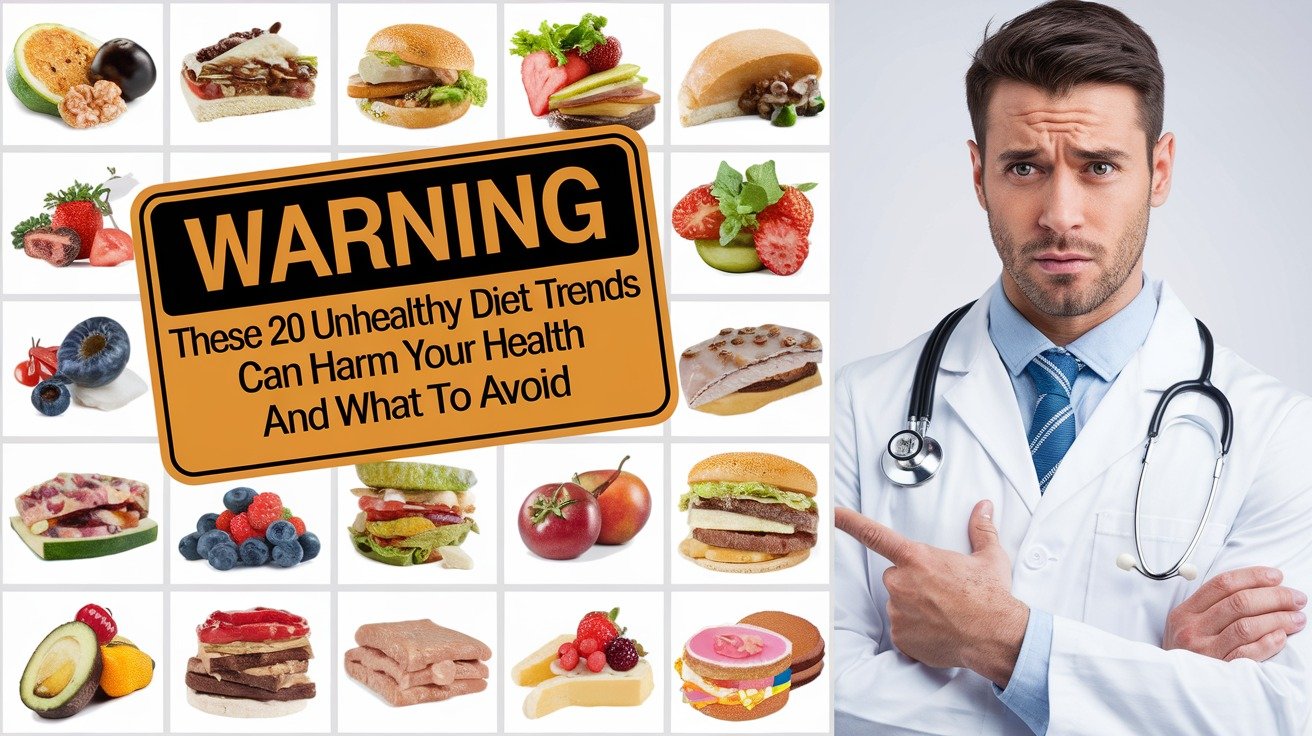In today’s world of instant gratification and quick fixes, it’s no surprise that diet trends emerge frequently, promising rapid weight loss and optimal health. However, many of these popular fads can be detrimental to your well-being. While some may produce short-term results, the long-term impacts can be devastating. Here are 20 unhealthy diet trends that you should always ignore, and how they can negatively affect your health.
1. Skipping Meals
Skipping meals, particularly breakfast, is often marketed as a way to reduce calorie intake. However, it can lead to slowed metabolism, fatigue, and nutrient deficiencies. Skipping meals may also encourage overeating later in the day.
2. Juice Cleanses
Juice cleanses claim to detoxify the body, but your liver and kidneys are already designed to handle detoxification. These cleanses often lack essential nutrients like fiber, protein, and healthy fats, leaving you feeling weak and hungry.
3. Keto Diet
While the keto diet has gained popularity for weight loss, it is incredibly restrictive and cuts out important food groups like fruits, grains, and certain vegetables. This can lead to nutrient deficiencies, including a lack of fiber, which is crucial for digestive health.
4. Cabbage Soup Diet
The cabbage soup diet involves eating nothing but cabbage soup for a week. Although it promises quick weight loss, it is extremely low in calories and nutrients, causing fatigue and dizziness.
5. Detox Teas
Detox teas claim to flush out toxins, but they often contain laxatives, which can lead to dehydration and electrolyte imbalances. Long-term use can also harm your digestive system.
6. Intermittent Fasting (Extreme)
While intermittent fasting can be beneficial for some, extreme versions of fasting, such as eating only once a day, can lead to disordered eating patterns, nutrient deficiencies, and fatigue.
7. Low-Fat Diets
Low-fat diets were once thought to be the key to weight loss, but fats are essential for hormone production, brain function, and energy. Cutting them out can lead to imbalances and nutrient deficiencies.
8. Raw Food Diet
The raw food diet promotes consuming only uncooked foods. While some raw foods are healthy, cooking can enhance the bioavailability of certain nutrients. Eating only raw foods can increase the risk of foodborne illnesses and nutrient deficiencies.
9. Paleo Diet
The paleo diet excludes grains, dairy, and legumes, which are all rich sources of fiber and nutrients. This restrictive diet can make it difficult to meet your nutritional needs.
10. Atkins Diet
The Atkins diet, similar to keto, limits carbohydrates and encourages high protein and fat consumption. However, cutting out carbs can lead to digestive issues, fatigue, and increased cholesterol levels.
11. Liquid Diets
Replacing meals with liquid shakes is a short-term solution that lacks long-term sustainability. These diets are often low in fiber, leaving you feeling unsatisfied and at risk for constipation.
12. Supplements for Weight Loss
Many weight loss supplements promise rapid results, but they often contain harmful ingredients that can cause side effects such as heart palpitations, nausea, and anxiety.
13. Fad Detoxes
Detox diets, like the Master Cleanse, rely on extreme caloric restriction and lack essential nutrients. They may result in weight loss, but most of it is water weight, which will quickly return.
14. Diet Pills
Like weight loss supplements, diet pills often contain unsafe ingredients that can lead to serious side effects like increased heart rate and liver damage.
15. No-Carb Diets
Cutting out carbs completely can lead to energy crashes, poor mood, and muscle loss. Carbs are essential for brain function and physical performance.
16. Alkaline Diet
The alkaline diet claims that certain foods can affect the body’s pH levels, but there is no scientific evidence to support this. Your body naturally regulates pH levels, and this diet can lead to nutrient imbalances.
17. Vegan Junk Food Diet
While a vegan diet can be healthy, relying on processed vegan junk food can lead to weight gain and poor health due to the high amounts of added sugars and unhealthy fats.
18. Sugar-Free Diets
While reducing sugar is beneficial, cutting out all sugar is nearly impossible and unnecessary. Many sugar-free products are loaded with artificial sweeteners, which can cause digestive discomfort and other health problems.
19. Extreme Calorie Restriction
Eating very few calories might result in rapid weight loss, but it can lead to muscle loss, nutrient deficiencies, and a slower metabolism. Over time, it becomes harder to lose weight, and regaining lost weight is likely.
20. Cheat Days
Having cheat days encourages unhealthy binge eating habits, which can lead to feelings of guilt and create an unhealthy relationship with food.
Conclusion
Many diet trends that promise quick and dramatic results can do more harm than good. Instead of following these unhealthy fads, focus on maintaining a balanced diet rich in whole foods, including fruits, vegetables, whole grains, and lean proteins. By avoiding these 20 unhealthy diet trends, you can protect your health and achieve long-term well-being. Always consult a healthcare provider before starting any extreme diet.







[…] restaurant-quality pasta at home can seem daunting, but with the right techniques and ingredients, it’s achievable and […]